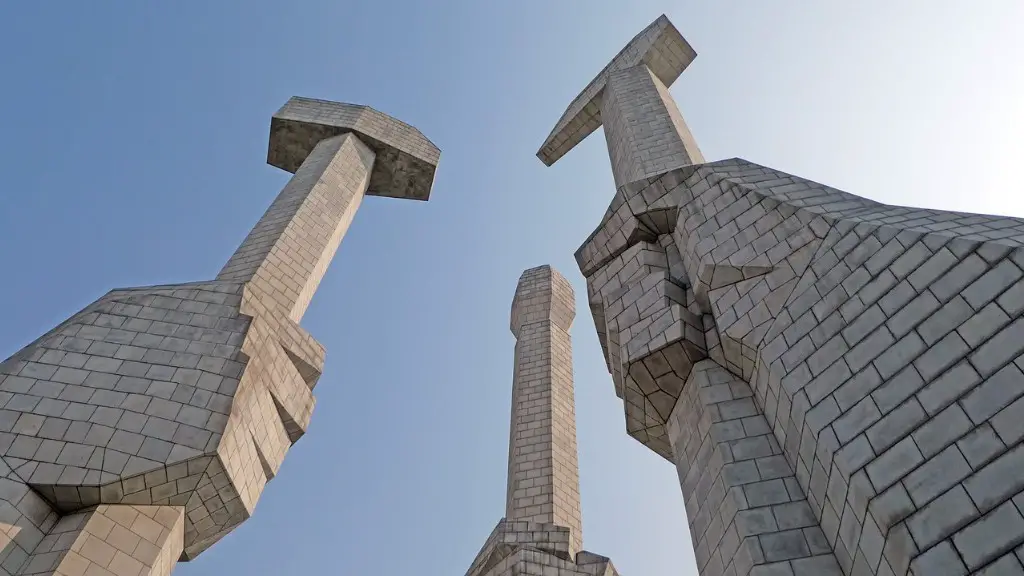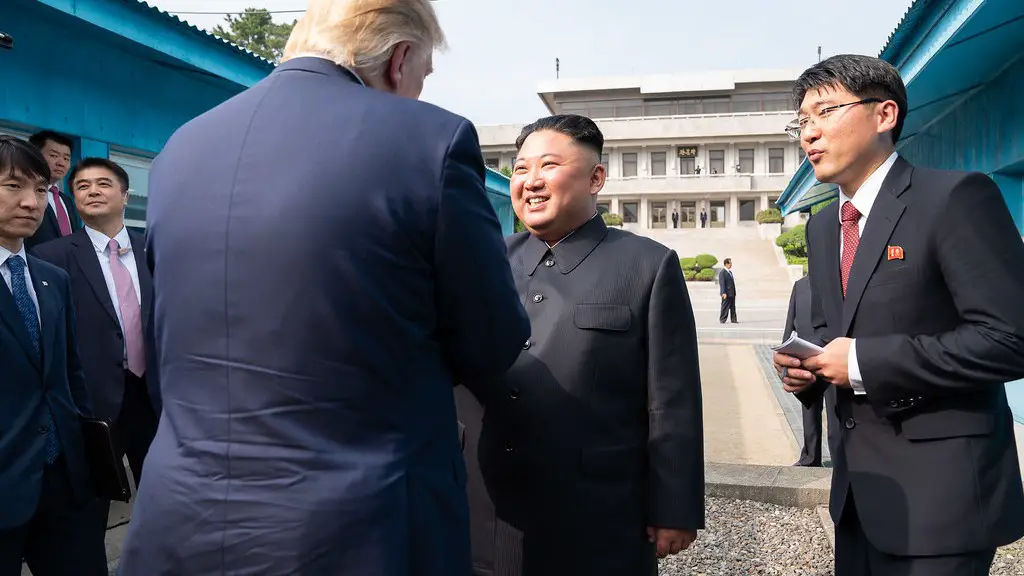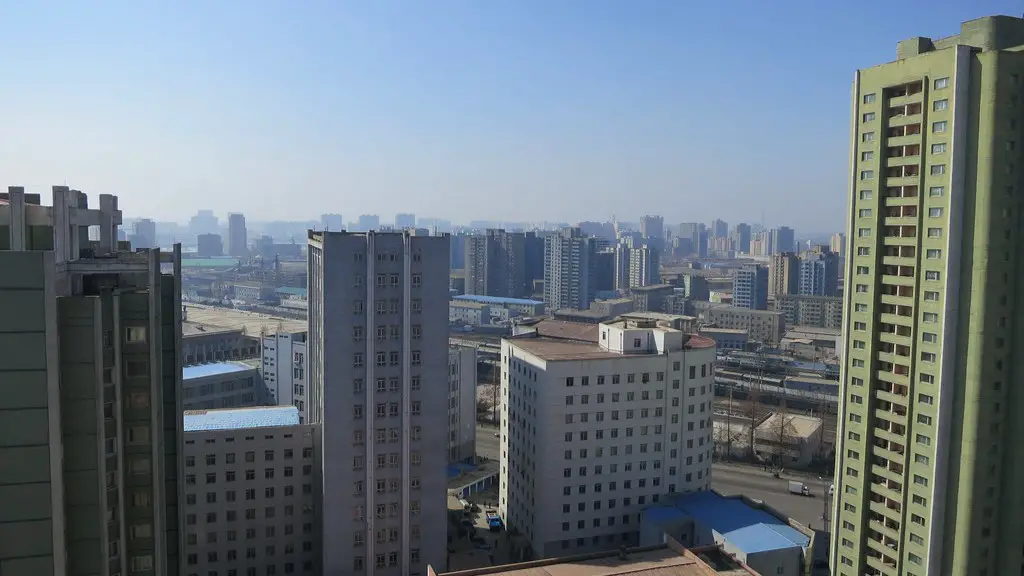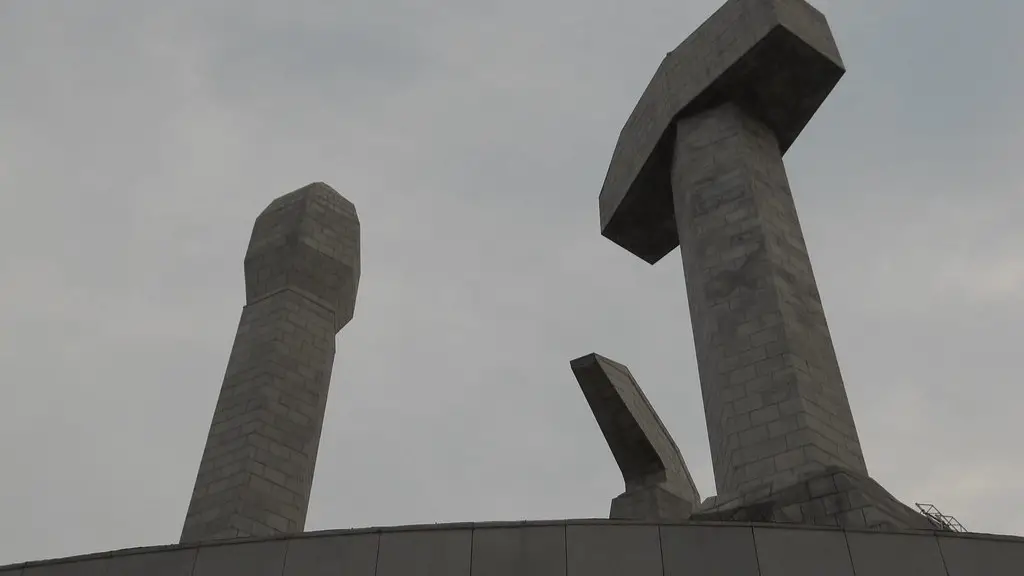North Korea has been a point of contention since its founding in 1948 after the collapse of Japan’s empire. It is isolated from the international community due to its aggressive foreign policy and its nuclear weapons program. For the past few decades, North Korea has been subject to heavy economic sanctions from the United Nations Security Council and the international community. The sanctions have crippled the economy to the point where it is hard for citizens to access basic necessities, create a better life, or travel outside the country. The lack of international cooperation and economic activity has branded North Korea as a pariah state. But is it really?
To answer this question,it is first important to understand the historical context of North Korea. After the Second World War, Korea was divided into two countries following the 38th parallel. The Soviet Union occupied the northern part while the USA occupied the south, which eventually saw the creation of North and South Korea respectively. The Cold War saw North Korea often pitted against South Korea in terms of politics and resources, a rivalry that continues even today. North Korea adopted a policy of ‘juche’, which is a socialist interpretation of self-reliance. To bolster this ideal, North Korean leaders often resort to aggressive rhetoric and military demonstrations.
According to some experts, North Korea is a pariah state due to its belligerent foreign policy. It is also widely believed that North Korea is responsible for numerous human rights violations. For instance, the regime has been accused of using chemical weapons against its own people. It is widely believed that the dwindling economy has resulted in severe malnutrition and food shortages, leading to child labor and other humanitarian concerns. North Korea also maintains a tight grip on information and communication in the country, severely limiting people’s access to knowledge, news, and technology.
However, it is worth noting that North Korea is not completely isolated. It has diplomatic ties with at least 14 countries, the most important of them being China. Additionally, North Korea has opened its borders to foreign tourists, with some claiming that it is a unique unique travel destination. Furthermore, the two Korean states were able to form an Economic Cooperation Committee in 2018, which aimed to increase economic cooperation between the two countries. Although it has been criticized for its human rights abuses and its refusal to open up its borders completely, North Korea has shown some signs of improving its relations with South Korea and the rest of the world.
It is difficult to say whether North Korea is a pariah state or not. On the one hand, it has been hostile to the international community and human rights organizations, and has resorted to aggressive tactics to gain power and influence. On the other hand, it has taken steps towards greater economic cooperation and dialogue with the rest of the world. Thus, it can be said that North Korea is in a precarious position, as it is neither completely opened up nor completely isolated.
The Impact Of North Korean Foreign Policy On The International Community
One of the most pressing issues relating to North Korea is the impact its foreign policy has had on the international community. North Korea has been a source of constant worry and tension in Asia since its inception. It has often resorted to military threats, missile tests, and other aggressive tactics in order to gain an upper hand in diplomatic negotiations. This has been met with severe backlash from the international community, with the United Nations Security Council imposing heavy sanctions on the country. The sanctions have targeted the country’s economy and its access to resources, in an attempt to force North Korea to comply with international law. This has had a direct and profound effect on the international community, with experts arguing that, if leftunchecked, North Korea’s destabilizing tactics can plunge the region into a state of unrest.
The international community has long viewed North Korea as a threat due to its nuclear weapons program and aggressive foreign policy. The United States and its allies have taken a hard-line approach to the North Korean government, with former US President George Bush famously labeling North Korea as part of an “axis of evil”. In spite of this, North Korean leaders have remained defiant and have repeatedly threatened to retaliate against any foreign threats. This has resulted in a tense stalemate in the region, where both sides have exhausted every available diplomatic option and are now unwilling to compromise.
The Impact Of Sanctions On North Korean Citizens
The sanctions imposed on North Korea by the United Nations Security Council range from freezing the regime’s assets abroad, prohibiting the sale of military equipment, and severely limiting its access to foreign currency. As a result, North Korean citizens have been severely affected by these sanctions, as they have been unable to access basic commodities such as food and medical supplies due to the lack of foreign currency. This has resulted in widespread poverty and malnutrition, with UN reports claiming that up to a quarter of North Korean children are suffering from chronic malnourishment. Additionally, citizens have limited access to information and communication, as the government has severely curtailed the use of the internet and other means of communication. This has made it difficult for citizens to access essential news, resources and education, which has further exacerbated the situation in North Korea.
Furthermore, the sanctions have caused instability in the economy, leading to a lack of jobs and a lower standard of living. Many citizens have had to rely on the black market to get food, medicine, and other essentials, leading to instances of corruption and exploitation. This has led to a severe depletion of the economy, making it difficult for citizens to create a better life for themselves and their families.
While the international community has stated that the sanctions are targeted at the regime and not the citizens, the impact of these sanctions on ordinary North Korean citizens cannot be ignored. The lack of basic necessities has led to immense suffering, with the population facing poverty, malnutrition, and limited access to essential services. It is important to note, however, that North Korea remains a closed country, making it difficult to obtain reliable information on the wellbeing of its citizens.
The Role Of China In North Korean Diplomacy
China has been a major player in North Korean diplomacy over the years. North Korea was one of the few countries to establish diplomatic ties with China, dating back to the Korean War. This resulted in a unique relationship between the two countries, with China becoming North Korea’s main trade partner and ally. Additionally, China has been a major proponent of reducing economic sanctions against North Korea, oftentimes using its influence to reduce the severity of these sanctions. This has been beneficial for North Korea, as it has been able to access foreign currency to buy basic necessities and resources. For instance, China has been supplying North Korea with food and fuel, which has helped it survive economically.
In addition to this, China has also been a major proponent of establishing economic cooperation between North and South Korea, with the two countries forming an Economic Cooperation Committee in 2018. This has been beneficial for North Korea, as through this committee, North Korea has been able to create economic links with South Korea and receive access to resources and technologies. This has been instrumental in reducing tensions in the region and decreasing the potential for conflict.
The Probability of North Korea Reforming
North Korea has been fiercely anti-reform since its inception, with successive North Korean administrations following the policy of ‘juche’, or self-reliance. However, some experts believe that North Korea is beginning to reform its policy, albeit slowly. This has been seen in the country’s willingness to engage in economic cooperation with South Korea and its participation in talks with the United States. Additionally, North Korea has opened its borders to foreign tourists and eased restrictions on communication and speech, which has been widely seen as a positive step in the right direction.
The importance of reform in North Korea cannot be understated, especially as it is facing crippling economic sanctions from the international community. Although reform appears to be a long way off, it is possible that if North Korea is willing to open its borders completely, reduce restrictions on communication and speech, and cooperate with the rest of the world, it could potentially lead to a more peaceful and prosperous region.
The Role Of South Korea In North Korean Diplomacy
South Korea has often been viewed as an ‘ally’ of North Korea, although the two countries are technically still at war. Since the end of the Korean War, South Korea has been a major proponent of reuniting the two countries, and has tried numerous times to engage in dialogue with the North. South Korea has also tried to create economic links with North Korea, in order to create better relations between the two countries. These efforts have not been without their challenges, as North Korea has often been unwilling to cooperate and engage in dialogue.
Nevertheless, South Korea has been increasingly willing to pursue economic cooperation with North Korea. This was seen in the formation of the Economic Cooperation Committee between the two countries in 2018. This committee has been instrumental in increasing economic ties between the two countries and has provided North Korea with the resources to cope with its economic sanctions. Additionally, South Korea has tried to reduce tensions on the Korean peninsula by engaging in talks with North Korean officials and engaging in cooperative activities such as the 2018 Winter Olympics.
South Korea has been a pivotal player in North Korean diplomacy, as it has been a proponent of opening dialogue and economic cooperation between the two countries. This has been beneficial for both countries, as it has created greater economic opportunities and reduced the prospect of conflict and violence.
The Role Of The United Nations In North Korean Diplomacy
The United Nations has been an influential player in North Korean diplomacy over the years. The United Nations Security Council has imposed numerous economic sanctions on North Korea, ranging from banning the export of military equipment to freezing the regime’s assets abroad. These sanctions have been instrumental in voicing the international community’s disapproval of North Korea’s actions, and have severely damaged the country’s economy. Additionally, the United Nations has been vocal in its condemnation of North Korea’s human rights abuses, issuing statements and resolutions aimed at getting the regime to adhere to international law.
The United Nations has been an important player in North Korean diplomacy, as it has been one of the few international entities with any degree of influence over North Korea. Despite the heavy criticism the country has received, North Korea has been willing to negotiate with the United Nations and other international bodies, demonstrating that it is at least willing to engage in dialogue.
The Probability Of North Korean Denuclearization
North Korea’s pursuit of nuclear weapons has been a major source of tension for the international community for decades. North Korea has long held the position that it will not give up its nuclear weapons, and has repeatedly refused to negotiate on the issue. In spite of this, some experts believe that North Korea may be willing to reconsider its stance on nuclear weapons if it receives the assurances it is looking for from the international community. This includes things such as the lifting of sanctions and an end to hostile rhetoric from the United States.
However, there is no guarantee that North Korea will comply with these conditions. It is possible that North Korea may agree to negotiate on the issue of nuclear weapons, but ultimately refuse to give them up. Additionally, North Korea has a long history of violating international agreements and making false promises, so the international community should remain cautious when negotiating with them.
Despite this, it is important to note that denuclearization of the Korean peninsula is possible, if both sides are willing to compromise. This would be beneficial for both countries, as it would lead to





